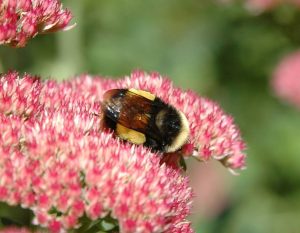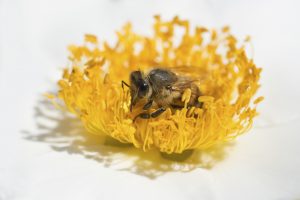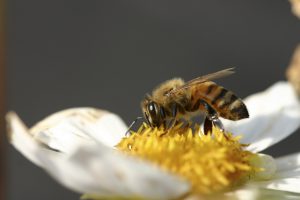WHY (AND HOW) YOU SHOULD BRING BEES TO YOUR GARDEN
 We have all heard quite a bit in the news about disappearing honeybees, which – by the way – are not native to North America. And the same things that are killing off honeybees are killing off our native wild bees, which actually do most of the pollination that produces our food.
We have all heard quite a bit in the news about disappearing honeybees, which – by the way – are not native to North America. And the same things that are killing off honeybees are killing off our native wild bees, which actually do most of the pollination that produces our food.
And since 2006, there’s been a global drop-off in wild bumblebee populations. Several bumblebee species that were extremely common 30 years ago are now at risk of extinction.
Because most bees are small and sometimes considered a nuisance, you may not have noticed or paid attention to them.
The reality is that bees play an important, daily role in a variety of ways:
- Agriculturally
- Economically
- Industrially
Recently, there’s been a movement to help bring back pollinators.
And you can do your part by using the backyard landscape design you already have.
BEES DO A LOT MORE AND WORK A LOT HARDER THAN YOU THINK
At Cedargate Landscaping, we took a quick poll asking people what comes to mind first when they think of bees.
The top (and only) two answers were either honey or stingers.
Yes, those are important aspects to wild bees and honeybees.
But there’s more to them than just sweet honey or painful stings.
The world relies on bees for…
FOOD PLANT POLLINATION

And 75% of the food we eat requires a pollinator of some sort.
Without bees to transport that pollen, those crops would fail and people wouldn’t have food to eat.
Some of the crops which rely on bee pollination include:
- Potatoes
- Onions
- Strawberries
- Watermelons
- Lemons & limes
- Tomatoes
- Green peppers
- Apples
- Grapes
Fewer bees mean less fresh fruits and vegetables to enjoy.
ANIMALS
Further to the first point about crop pollination, many of the animals we rely on as food, themselves feed on pollinated plants.
Without bees’ hard work in alfalfa fields and other places, the animal population would be greatly impacted.
And once again, it would have an impact on our daily diets too.
FUEL, CLOTHING, COTTON
You might not think about wild bumblebees when putting on your backyard sun hat, but they work hard in this area too:
- Biofuels (like wood, green diesel & ethanol) need canola for production…
- Canola is pollinated by bees and is an integral part of our future because…
- Fossil fuel reserves are being depleted daily
Cotton plants are also dependent on bees for pollination. If the world’s cotton supply ever gets low, more synthetic materials will be required for clothing.
More synthetic materials require more fossil fuels to create – which means they’ll run out even faster.
MEDICATIONS
Numerous medicines and homeopathic remedies need pollinated plants in order to produce their helpful (and potentially life-saving) flowers.
WHAT CAN YOU DO?

Here are some tips to turn your garden into a bee-friendly sanctuary:
Plant a fruit garden
Bees love fruit. Plants like blueberries, blackberries, catnip, pumpkin and squash will definitely get their attention.
Colourful flowers
Bees have excellent vision. With colourful plants and planting displays (go for blue, violet, white and yellow plants), hard-working bees will be attracted to your garden.
Pollen and Nectar
Bees rely on pollen to feed their offspring, and nectar to feed themselves. Other important pollinators such as butterflies, moths – and even your friendly hummingbird – depend on a steady supply of nectar to survive.
Hybridized plants look beautiful, but in the same way the scent has been bred out of some types of roses, many hybrid flowering plants produce little to no nectar. Do your homework before buying flowering plants and make sure at least some (or better yet, most!) provide food for our little pollinators.
Build a bee bath
Fill a bowl or plate with rocks. Add water but make sure the top of the rocks remain dry (bees need a dry place to land). Place the bowl or plate on a level surface in your garden and watch the bees flock to it.
DON’T BECOME A BEEKEEPER
Many people have taken it upon themselves to become beekeepers in order to help reverse declining bee populations.
And while it’s a noble gesture, it should really be left to the professionals for a variety of reasons:
- Hobbyists are not as well equipped to handle the many diseases plaguing honeybee colonies
- These diseases spread into local, native populations of bees
- Recent publicity has generated an explosion of beekeeping in urban areas by well-meaning people who want to help; unfortunately, there are far too few flowers out there to support them all
- When there’s competition for pollen and nectar, wild native bees just don’t stand a chance against the big numbers and fierceness of honeybees – which puts our native bees at even more risk
- Honeybees won’t go extinct – there is a billion dollar industry behind them to make sure they don’t; Bumblebees and other wild bees, on the other hand, are on their own and very much in danger of quietly disappearing
You do far more to help bees – ALL bees – by transforming your garden into a bee-friendly zone rather than diving into beekeeping.
LET US HELP YOU HELP THE BEES
Want to do your part in saving the bees?
That’s great. And we want to help.
Whether you need plants, landscape services or helpful gardening tips, we’ve got you covered.
Contact us for more information or to request a FREE garden consultation right at your own home.
- WHY TRUST IS SO IMPORTANT TO US - December 15, 2019
- MORE ON LANDSCAPE LIGHTING - February 16, 2019
- 5 Ways Landscaping Can Increase Your Home Value - January 5, 2019
